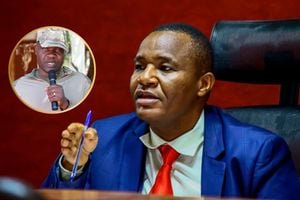
Law Society of Kenya president elect Faith Odhiambo during an interview at Ombok and Owuor Advocates offices in Nairobi on March 2, 2024.
Civil court sessions bear a certain forbidding solemnity and implacable directionality, which frequently alienates even qualified advocates, and leaves the lay public petrified in perplexity, helpless before an unstoppable juggernaut, much like an infant in the path of a herd of addled pachyderms.
All the esoteric fare on display: mystical ramparts of procedure, the liturgical incantation of forensic arcana, the unmistakably ecclesiastical organisation of the personnel and the customs and rituals of the court mean that the lawyerly retinues in attendance at our temples of justice constitute a priestly elite and ferocious gatekeepers of the good favour of the spirit of the law and the gods of justice.
It takes 6 years, at the very minimum, for our system to produce a half decent juristic acolyte, a postulant eligible to seek admission into the bar and commence the laborious climb up the ladder of refinement through continuous learning and practice, into the rarefied ranks presumed to possess the requisite gravitas and nous to serve in positions of high constitutional responsibility, within and outside the judiciary.
Before our courts, therefore, are priests retained to intercede for clients before the altar, labouring to appeal to the good graces of the presiding primate, and so please the court that the prayers and petitions they have humbly submitted, are affirmed.
The lay public are also entitled to supplicate in humble petition and entertain legitimate hopes of favourable outcomes in the name of justice.
It just so happens that whenever a citizen appears in person before our courts to represent themselves, they invariably temper the efficiency of court business, and the smooth flow of proceedings at the hands of experienced advocates. Often, these citizens know not a jot of what the law says in regard to their grievances and claims, relying only on the compelling visceral conviction that their causes are legitimate in any language.
Court personnel are therefore obliged to assist them navigate the bewildering gamut of mandatory pleadings, depositions and declarations, motions and other filings, as well as the requirements of appearance before court.
Against a qualified advocate, the unrepresented citizen is prey to predacious sleights of hand and the prejudicial deployment of informational asymmetry. Against a similarly situated citizen, proceedings acquire a gruelling viscous turgidity as they clog and congest the twists and turns of a system that relies on procedural fluency for effectiveness.
The palpable exasperation with unrepresented citizens in our courts often devolves into outright hostility, with both subtle and explicit pressure directed at them to retain representation by counsel. Vicious magistrates and predatory lawyers ensure that no grace is available for failure to comply with procedures, and the frequent invocation of “ignorance is no defence” frequently issues from learned lips.
The majority of citizens with urgent need of justice cannot afford representation, often as a direct consequence of the cause of action. This means that their agency , especially in terms of their ability to extricate themselves from prejudice, depends on the court's capacity to deliver substantive justice without undue regard to procedural technicalities, as required by the letter and spirit of the law.
Hostility to unrepresented citizens, therefore, not only assaults their fundamental right to non-discrimination and to equal protection of the law, it privileges those who can afford the steep fee charged by lawyers, and deliberately conspires to affirm the diabolical proposition that justice is the exclusive property of the wealthy. It is not just, reasonable to force citizens to retain legal representation. In fact, the measure of a judicial system's credibility and legitimacy is its capacity to dispense justice to unrepresented citizens expeditiously.
Liberating our court system from the intolerable constipation of unresolved cases which chronically clog its intestines calls for the acquisition of a capacity to serve unrepresented citizens without delay. The establishment of Judiciary Desks at Huduma Centres in various court stations, is definitely a promising step in the right direction. It employs digital technology and automation of processes to deliver efficient, urgently required services to citizens: justice delayed, after all, is justice denied.
Quite embarrassingly, the Law Society of Kenya spent the last election season mobilising aggressively against this progressive development on grounds that it deprives lawyers of their bread and butter. Formally, the secretary of the LSK has warned the judiciary of outright revolt and sabotage by LSK unless the decision to establish the desks is rescinded. The reasons cited are lack of consultation and unspecified ‘negative implications’ .
The reason why LSK's attitude to progress is embarrassing are twofold. First, of course, is the suggestion that self-representation is illegal. Secondly, and more concerning, is the implication that broadening access to justice for citizens necessarily endangers the legal profession, or that efficient citizen-centred judiciary is inherently undesirable.
The LSK's unfortunate tantrum profiles it quite tragically as an out-of-touch, parasitic cabal in the order or depraved priesthoods which have decayed and perished throughout history because they became incorrigible cults of venal idolatry, and desecrated shrines of profane heresies.
Mr Ngéno is an Advocate of the High Court










